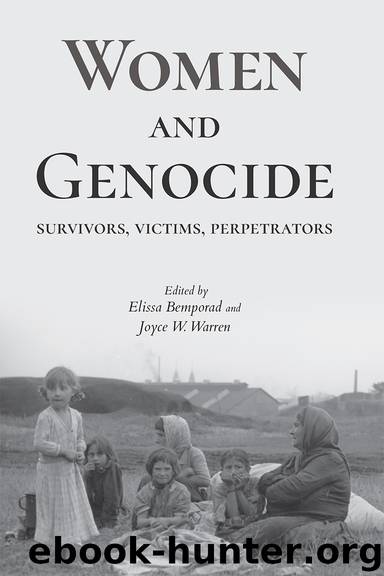Women and Genocide by Elissa Bemporad Joyce W. Warren

Author:Elissa Bemporad,Joyce W. Warren
Language: eng
Format: epub
Publisher: Indiana University Press
Published: 2018-05-03T16:00:00+00:00
In my interviews, I was particularly interested in whether the Birangona women had a choice in the matter of pregnancy and the high rates of terminations that took place. When I asked Geoffrey if the social workers and the medical personnel involved respected women’s choices to either have abortion or not to go through with it he replied, “Nobody wanted to talk about it. You could not ask questions and get an answer. Quite often it would be that they couldn’t remember. And the men didn’t want to talk about it at all! Because according to them the women had been defiled. And women’s status in Bangladesh was pretty low anyway. If they had been defiled, they had no status at all. They might as well be dead.”40
In interviews with the ASK oral history team, both Nilima Ibrahim and Maleka Khan, prominent social workers heavily involved in the rehabilitation program of Birangona, noted that given the nature of social relations and family attitudes, women effectively had no choice.
The attitudes and decisions taken by the social workers and medical staff in the rehabilitation centers similarly reflected patriarchal, traditional values about family, community norms, and state policies, and thus endorsed decisions to reintegrate women into society as soon as possible by keeping their trauma and ordeal a secret, contributing to the silencing in official documents and personal narratives. Respondent B, who worked in the rehabilitation projects, and was particularly involved in the adoption programs, commented, “There was a wound. We tried to rehabilitate them, tried to accept the situation they were in. And we would never write names, neither addresses. Stigma would remain if people knew.”41
In the aftermath of the war in Bangladesh, Badrunnesa Ahmad, Bangladesh’s first Minister of Education (1973–75), and Nurjehan Murshid, State Minister for Health and Social Welfare (1972–73) and Minister of Social Affairs and Planning (1973–75), in the Parliament demanded justice on behalf of the Birangona. Yet, there also existed a vast power discrepancy between the Birangona and the social workers, government officials, or others who were involved in the government’s rehabilitation programs for the women. The shame and stigma attached to sexual violence were not challenged. Instead there was an implicit charity-focused approach that denied women the opportunity to voice their protests if they were unwilling to cooperate with the state’s prescribed policies. Women were cast as victims, and only as victims did they deserve the state’s assistance. In these contexts, it was almost impossible for women to speak out as strong and outspoken survivors.
On January 7, 1972, in response to the development of women’s movements, the Government set up the Central Organization for Women’s Rehabilitation, to institutionalize women’s rehabilitation programs and place them under the management of the national central women’s rehabilitation board which coordinated the government’s postwar policies with regard to women. The chairperson, Sufia Kamal, along with Taslima Abed, Shahera Ahmed, Hajera Khatun, and others, started the rehabilitation programs in two houses in Eskaton, Dhaka.42 In 1974, the name of the board was changed by legislation to the Bangladesh Women’s Rehabilitation and Welfare Foundation.
Download
This site does not store any files on its server. We only index and link to content provided by other sites. Please contact the content providers to delete copyright contents if any and email us, we'll remove relevant links or contents immediately.
| Civilization & Culture | Expeditions & Discoveries |
| Jewish | Maritime History & Piracy |
| Religious | Slavery & Emancipation |
| Women in History |
Cecilia; Or, Memoirs of an Heiress — Volume 1 by Fanny Burney(32558)
Cecilia; Or, Memoirs of an Heiress — Volume 2 by Fanny Burney(31956)
Cecilia; Or, Memoirs of an Heiress — Volume 3 by Fanny Burney(31942)
The Secret History by Donna Tartt(19089)
Sapiens: A Brief History of Humankind by Yuval Noah Harari(14389)
Leonardo da Vinci by Walter Isaacson(13336)
The Radium Girls by Kate Moore(12028)
Sapiens by Yuval Noah Harari(5371)
How Democracies Die by Steven Levitsky & Daniel Ziblatt(5219)
The Wind in My Hair by Masih Alinejad(5095)
Homo Deus: A Brief History of Tomorrow by Yuval Noah Harari(4918)
Endurance: Shackleton's Incredible Voyage by Alfred Lansing(4783)
Man's Search for Meaning by Viktor Frankl(4606)
The Silk Roads by Peter Frankopan(4534)
Millionaire: The Philanderer, Gambler, and Duelist Who Invented Modern Finance by Janet Gleeson(4478)
The Rape of Nanking by Iris Chang(4213)
Joan of Arc by Mary Gordon(4112)
The Motorcycle Diaries by Ernesto Che Guevara(4102)
Stalin by Stephen Kotkin(3966)
